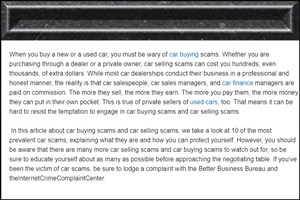Buying Car Scams
Vehicle Will Never Arrive After the Successful Payment:
The buyer should check the authenticity of the seller, his reputation as a seller, number of successful sales he has done previously, his origin and point of contact, address and other such important details. If the buyer have not met the seller before he should try to meet him personally before making the transactions. The buyer can even speak to the seller before making the payment. If the seller belongs to different countries the buyer can request an intermediate operating in that country to inspect the car. The customer should also check the mail twice or thrice before coming to conclusion. If he finds anything fishy he can drop the sale and look out for other deals. The customers should immediately inform the cyber crime police if they receive any buying cars mails.
Buying car scams can take various forms, but they all aim to defraud individuals looking to purchase a vehicle. These scams can result in financial losses and legal troubles for victims. To protect yourself from car buying scams, it's essential to be vigilant and take precautions. Here are some common car buying scams and how to avoid them:
1. Online Listing Scams: Description Inaccuracies: Scammers create fake online listings for vehicles at attractive prices. When you contact them, the vehicle's condition may be vastly different from what was advertised. Request for Deposit: Scammers may ask for a deposit to hold the vehicle, only to disappear with your money.
Avoidance: Always verify the legitimacy of online listings. Request detailed information, ask for additional photos, and consider using reputable online marketplaces or dealerships.
2. Title Washing: Stolen or Salvage Vehicles: Scammers may sell vehicles with stolen or salvage titles as if they have clean titles, concealing their true history.
Avoidance: Obtain a vehicle history report (e.g., Carfax) and have the vehicle inspected by a trusted mechanic before purchase. Verify the title and registration details with your local DMV.
3. Overpayment Scams: Fake Overpayments: Scammers may pay more than the agreed-upon price for the vehicle (e.g., via check) and then ask you to refund the excess money. The initial payment method is fraudulent, and you'll end up losing money.
Avoidance: Be cautious when dealing with overpayments. Verify the payment method, wait for funds to clear before transferring a refund, and consider using secure payment methods like bank wire transfers.
4. Escrow Scams: Fake Escrow Services: Scammers may suggest using an escrow service they control, making it appear legitimate. Once the money is sent, they disappear.
Avoidance: Use reputable and established escrow services that both parties agree upon. Verify the legitimacy of the chosen service independently.
5. Bait and Switch: Different Vehicle: Scammers may advertise a specific vehicle but try to sell you a different, lower-quality one when you arrive to inspect or purchase it.
Avoidance: Carefully inspect the vehicle and its documentation to ensure it matches the advertised details. Don't settle for a different vehicle unless you agree to the change in terms.
6. Title Skipping: No Title Transfer: Scammers may avoid transferring the title into your name, leaving you responsible for any outstanding debts or issues associated with the vehicle.
Avoidance: Ensure that the title transfer is completed correctly and that you have all necessary documentation. Verify the title's authenticity and contact your local DMV for guidance.
7. Curbstoning: Unlicensed Sellers: Some individuals pose as private sellers but are actually unlicensed dealers. They may sell vehicles with hidden problems or forged documents.
Avoidance: Research the seller's background, check for any suspicious patterns of car sales, and be cautious if the seller avoids providing their real identity or address.
When buying a car, it's crucial to conduct thorough research, inspect the vehicle carefully, verify documentation, and use secure payment methods. If something doesn't seem right or if you encounter any red flags during the buying process, trust your instincts and consider seeking advice from a trusted mechanic, legal professional, or consumer protection agency.










